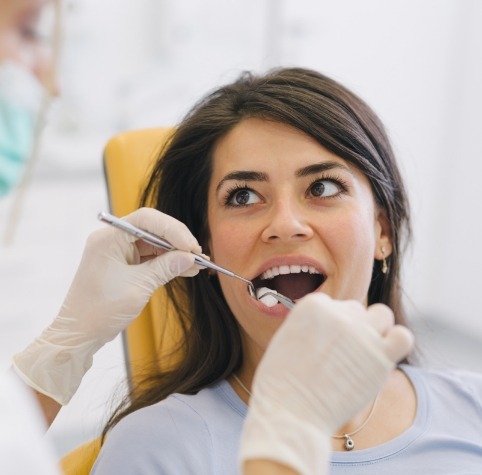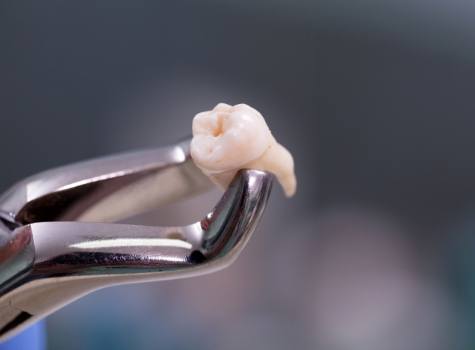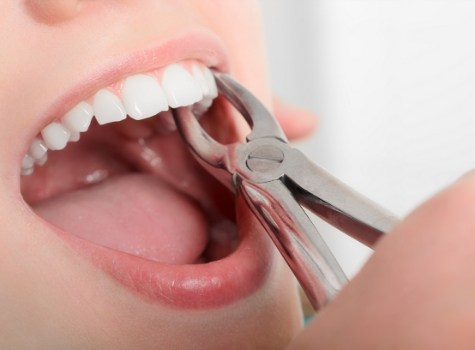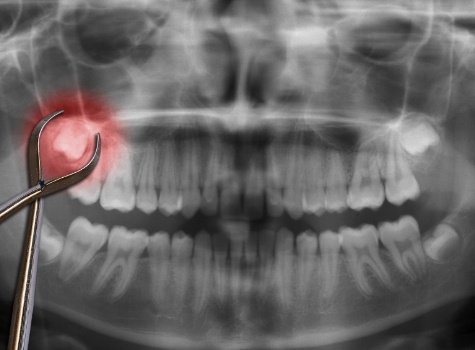Tooth Extractions – Hoover, AL
Comfortable, Safe, and Effective Tooth Removal

During your dental exam, Dr. Moulton may determine that you need a tooth extraction, which can be due to a number of different reasons. For one, teeth may be significantly decayed. In other cases, advanced gum disease could have damaged them in such a way that is beyond repair. Additionally, if they are trapped underneath existing teeth (impacted) or preventing you from starting orthodontic treatment, they may need to be removed with safe, predictable tooth extractions in Hoover, AL.
Why Choose Moulton Dentistry of Hoover for Tooth Extractions?
- Soft Tissue Laser Technology Improves Comfort and Precision
- Nitrous Oxide to Help Put You at Ease
- Relaxing Dental Office Environment Dedicated to Your Comfort
Why We Typically Avoid Tooth Extractions

When a tooth is removed, it often leads to issues with your ability to chew food. It can also cause problems to your jaw joint, make neighboring teeth shift out of place, and even result in a major negative impact on your oral health.
In most cases, we can avoid these complications. During your consultation, Dr. Moulton will discuss treatments that can act as alternatives to tooth extraction. He’ll also go over how to best replace the missing tooth.
What to Expect from Tooth Extraction

To start, Dr. Moulton will numb your tooth, the gums surrounding the tooth, and the jawbone with a local anesthetic.
During treatment, you’ll feel a small amount of pressure. This pressure is caused by the dentist rocking the tooth back and forth, which widens the socket. This makes it easier for removal.
While you may feel pressure, there’s no pain present because your nerves have been numbed by the local anesthetic. This means we can stop any transference of pain, even though the nerves responsible for transferring pressure aren’t significantly affected.
If at any point you experience pain or discomfort during your treatment, don’t hesitate to let us know as soon as possible.
The Tooth Sectioning Process

In some cases, a tooth needs to be sectioned. When a tooth is firmly anchored in the socket or curved in a way that prevents us from widening the socket enough for removal, we can carefully break down the tooth into smaller pieces. This is a relatively common procedure that Dr. Moulton has significant experience performing.
Tooth Extraction Post-Op Instructions

It’s essential that a blood clot forms after the tooth is extracted. This stops bleeding and allows the socket to begin the healing process. We’ll ask you to bite down onto a gauze pad immediately following the appointment, typically for about 30 to 45 minutes. Place another gauze pad and bite down firmly for about 30 minutes if any bleeding or oozing continues after the initial placement. Be prepared to add additional gauze pads as needed to control the bleeding.
Once a blood clot forms, make sure you do not disturb it under any circumstances. Do not rinse the wound vigorously as this can easily dislodge it. Avoid brushing teeth near the extraction site, smoking, drinking alcohol, or using a straw for the next 72 hours. Doing so can also dissolve or dislodge the clot and negatively affect the healing process. Do not exercise for at least 24 hours following treatment. Active movement increases your blood pressure, which then can cause increased bleeding.
It’s common to feel some mild discomfort and swelling following your extraction. To reduce swelling, apply an ice pack or a bag of frozen vegetables to your face. Just make sure to wrap it in a towel first to avoid direct contact with the skin. If you have prescribed pain medications, take them as instructed. Swelling should subside after about 48 hours.
Take all pain medications as instructed by Dr. Moulton. If the medication does not appear to be helping, call our dental office right away. Continue to take antibiotics as prescribed even if your signs and symptoms start to disappear. Pay close attention to your fluid intake and make sure to drink plenty of water as you heal. Keep to a diet of soft food on the day of your treatment. Once you feel more comfortable, you can restart your normal diet.
Make sure to continue your daily brushing and flossing after 24 hours have passed. This includes brushing and flossing daily. Doing so will accelerate the healing process and keep your mouth as clean as possible.
Once a few days have passed, you should start to feel normal and be able to resume your regular activities. However, if swelling, heavy bleeding, or severe discomfort continues for more than three days, or you react negatively to your medication, call our dental office as soon as possible.
Understanding the Cost of Tooth Extractions

Even if you need a tooth extraction, you may fear its price. Fair enough – a treatment that “breaks the bank” simply won’t help. Still, the cost of tooth extractions varies by patient. You’ll want to consult Dr. Moulton for a more precise estimate. From there, our office will strive to make the service affordable. We’ll even walk you through its cost factors, insurance, and payment options. To learn more, keep reading or call us for the details.
Factors That Can Affect Tooth Extraction Cost

Before the extraction process, you’ll have a consultation with Dr. Moulton. This visit lets him assess the affected tooth (or teeth), your smile goals, etc. That way, he can learn the factors affecting your extraction’s price. Such things commonly include:
- Tooth Type & Location – As it turns out, some teeth cost more to extract. For instance, pulling front ones can be cheaper because they involve fewer steps.
- Number of Teeth Pulled – Of course, the number of teeth pulled will influence your expense. The more you need extracted, the higher your treatment price.
- Extraction Difficulty – A simple tooth extraction isn’t all that expensive. Meanwhile, a surgical one (i.e., involving tissue removal) is costlier.
- Tooth Replacement Options – If you need a tooth replaced after an extraction, treatment costs will rise. The extra charge will depend on whether you get dentures, dental bridges, or dental implants.
Does Dental Insurance Cover Tooth Extractions?

Luckily, dental insurance often does cover tooth extraction. Since the latter is a major dental procedure, most dental plans see it as necessary. So, they’ll typically meet up to 50% of an extraction’s price. (Assuming you’ve met your deductible, of course.)
Even so, there are some exceptions. Your own policy may not cover an extraction. Alternatively, coverage may only apply to specific teeth. You should thus confirm your benefits before treatment. Our team will even help you do so if necessary.
Other Options for Making Tooth Extractions Affordable

That said, insurance isn’t the only way to make extractions affordable. Many of today’s dentists offer financing options for their patients. Given the right one, pulling a tooth could easily fit within your budget.
Take Moulton Dentistry of Hoover, for example. We happen to provide:
- Special Offers – Currently, our office is running a special on emergency visits. For only $39.00, you can get a limited oral exam, dental X-rays, and diagnosis!
- Dental Savings Plan – For an annual fee, you can join our office’s dental savings plan. This setup provides (among other things) a free emergency exam and a 20% discount on extractions.
- Flexible Financing – Our office works with CareCredit, a reputable third-party financier. Through them, you could pay for an extraction in monthly installments.
Ultimately, we want to make your extraction smooth and affordable. Given that fact, please don’t delay and book a visit with our team!
Tooth Extraction FAQs
Will I have to take time off work for my tooth extraction?
We recommend that everyone take the day of their procedure off so they can relax and begin the healing process on the right foot. As for when you can return to work, it largely depends on how physical your job is. If you spend most of your time sitting at a desk, you can likely get back to work the next day. However, if you move around a lot and do physical labor, it may be better to wait two to three days. An excess of activity can make bleeding worse and even dislodge the clot necessary to promote proper healing.
How soon can I have my tooth replaced after an extraction?
The main factor that determines when we can replace an extracted tooth is the condition of the jawbone where the tooth was located. If the bone is relatively healthy and strong, we can use a bridge or dental implant to close the space as soon as the area heals. However, if the bone in the area is thin or weak, a patient may need to undergo a bone graft before an implant is an option. Of course, for the sake of speed, a bridge can usually be placed if the jawbone isn’t suited for implants.
Will getting a tooth extraction change my diet?
Only for a few days. We ask patients to stock up on soft items ahead of their extraction so they won’t have to do a lot of chewing during the initial part of their recovery. Items like scrambled eggs, soup, yogurt, and smoothies are all great options. Usually, a patient only has to adhere to a soft diet for two to four days before returning to their normal one in about a week.
Are tooth extractions covered by dental insurance?
Yes, tooth extractions are usually partially covered by dental insurance, but the percentage can vary from plan to plan. For patients without coverage, they can sign up for our in-house membership plan, which costs less than regular insurance and entitles patients to a flat 20% discount on many services on top of fully covering their routine preventive care for the year. Be sure to contact our team if you would like to learn more about the benefits!
